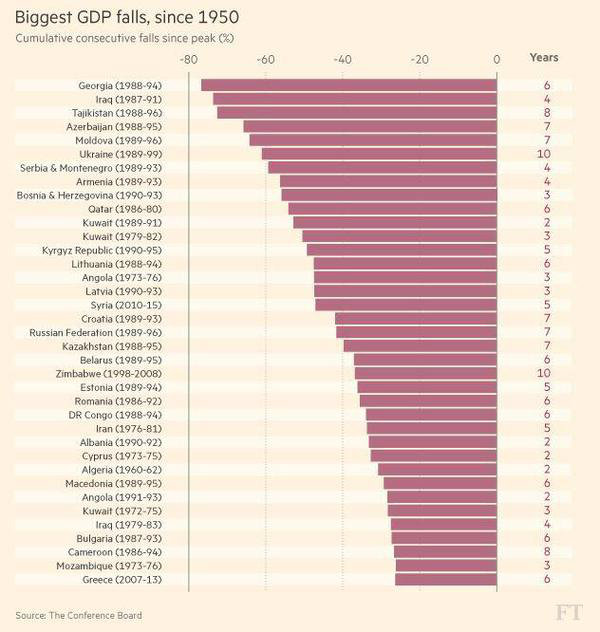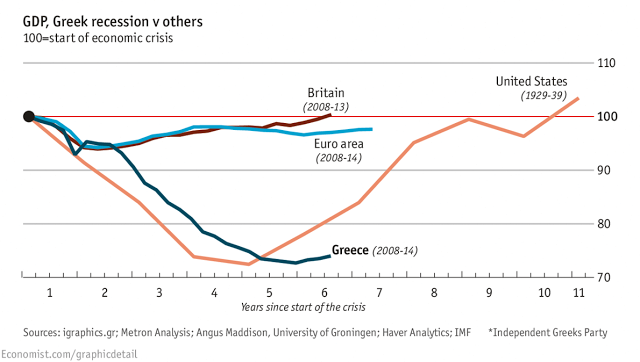Summary:
We're used to hearing that the current Greek depression is the longest and deepest since World War II, aren't we? And that the worst depression in history was the US's Great Depression?Via the FT's Tony Tassell comes this chart:Looks like the fall of the Iron Curtain, the collapse of the Soviet Union and the first Gulf War did far more damage. Not to mention the numerous wars and crises in Africa. The current Greek depression just about makes it on to the bottom of this chart, and the other recent EU disasters don't even figure. I can't imagine what it is like to live through a GDP collapse of nearly 80%. But there are people alive today in Georgia and Iraq who remember that dreadful time all too well. And the appalling collapse suffered by Latvia in 1990-3 made their 2009 recession seem mild by comparison, even though it was the deepest of any country in the EU at that time. Nor are these all depressions of the past. Halfway up this chart is Syria, which has suffered a GDP collapse of 50% in the last five years - and we aren't talking about that, though we notice the refugees streaming into Turkey, Egypt and (of all places) Greece, and we don't know what to do about them. Now look at this chart:Yes, that's right. Greece's depression is of a similar depth to the US in the 1930s, and on present trend will last longer. Recent developments may mean it deepens further, too.
Topics:
Frances Coppola considers the following as important: depression, Greece, US
This could be interesting, too:
We're used to hearing that the current Greek depression is the longest and deepest since World War II, aren't we? And that the worst depression in history was the US's Great Depression?We're used to hearing that the current Greek depression is the longest and deepest since World War II, aren't we? And that the worst depression in history was the US's Great Depression?Via the FT's Tony Tassell comes this chart:Looks like the fall of the Iron Curtain, the collapse of the Soviet Union and the first Gulf War did far more damage. Not to mention the numerous wars and crises in Africa. The current Greek depression just about makes it on to the bottom of this chart, and the other recent EU disasters don't even figure. I can't imagine what it is like to live through a GDP collapse of nearly 80%. But there are people alive today in Georgia and Iraq who remember that dreadful time all too well. And the appalling collapse suffered by Latvia in 1990-3 made their 2009 recession seem mild by comparison, even though it was the deepest of any country in the EU at that time. Nor are these all depressions of the past. Halfway up this chart is Syria, which has suffered a GDP collapse of 50% in the last five years - and we aren't talking about that, though we notice the refugees streaming into Turkey, Egypt and (of all places) Greece, and we don't know what to do about them. Now look at this chart:Yes, that's right. Greece's depression is of a similar depth to the US in the 1930s, and on present trend will last longer. Recent developments may mean it deepens further, too.
Topics:
Frances Coppola considers the following as important: depression, Greece, US
This could be interesting, too:
Angry Bear writes Healthcare in the United States
Merijn T. Knibbe writes ´Extra Unordinarily Persistent Large Otput Gaps´ (EU-PLOGs)
Merijn T. Knibbe writes In Greece, gross fixed investment still is at a pre-industrial level.
Frances Coppola writes The West must no longer tolerate Israel’s human rights breaches
Via the FT's Tony Tassell comes this chart:
Looks like the fall of the Iron Curtain, the collapse of the Soviet Union and the first Gulf War did far more damage. Not to mention the numerous wars and crises in Africa. The current Greek depression just about makes it on to the bottom of this chart, and the other recent EU disasters don't even figure.
I can't imagine what it is like to live through a GDP collapse of nearly 80%. But there are people alive today in Georgia and Iraq who remember that dreadful time all too well. And the appalling collapse suffered by Latvia in 1990-3 made their 2009 recession seem mild by comparison, even though it was the deepest of any country in the EU at that time.
Nor are these all depressions of the past. Halfway up this chart is Syria, which has suffered a GDP collapse of 50% in the last five years - and we aren't talking about that, though we notice the refugees streaming into Turkey, Egypt and (of all places) Greece, and we don't know what to do about them.
Now look at this chart:
Yes, that's right. Greece's depression is of a similar depth to the US in the 1930s, and on present trend will last longer. Recent developments may mean it deepens further, too. It may even catch up with Syria.
The next time someone claims the "mother of all depressions" was the US in the 1930s, will someone please show them Tony Tassell's chart?
Now look at this chart:
Yes, that's right. Greece's depression is of a similar depth to the US in the 1930s, and on present trend will last longer. Recent developments may mean it deepens further, too. It may even catch up with Syria.
The next time someone claims the "mother of all depressions" was the US in the 1930s, will someone please show them Tony Tassell's chart?


